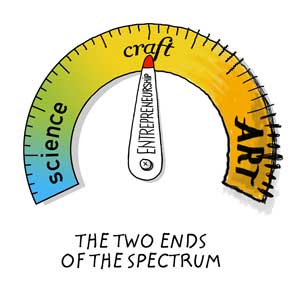Entrepreneurship Is a Craft and Here’s Why That’s Important
To inspire today’s generation of company builders, entrepreneurship education needs a common language and apprenticeship opportunities.
In my 20-plus years as an entrepreneur and seven years as an entrepreneurship educator, I have explored whether starting successful companies should be thought of as a science or an art. If entrepreneurship is a science, then I could easily teach my students that if they perform actions X and Y, they will get a result of Z. If it is an art, then it can be described no more precisely than as an ambiguous creative process that only a chosen few can pursue as a profitable career.
While I find many elements of entrepreneurship that draw from empirical processes, I also find many others that require creativity. In looking for a mental model that encompasses both requirements in a cohesive model for how to most successfully approach the startup process, I started thinking about potters. These skilled individuals imbue artistry into each pot they throw, but if they don’t have knowledge of the fundamentals of how to mold clay into finished objects, they won’t succeed in their goal. Pottery is neither science nor art. Instead, it’s a craft — a process that draws from both.
There are a few key characteristics of pottery that firmly plants it into the realm of craft, rather than being either an art or science:
It’s accessible. Almost anyone can make a pot from clay. It is not something available only to an elite few who are gifted with extraordinary talent.
It’s learnable. Pottery consists of a number of fundamental skills that aren’t obvious without being taught the particulars of the discipline, but these skills can be taught and learned. Luck alone does not make a potter.
It values unique products. When pottery is done well, it is beautiful and unique. The goal of many pottery craftspeople is not to mass-produce the same item that they or others have created before, but to make something new and valued.
It’s built on fundamental concepts. When a potter is learning how to throw clay on a pottery wheel, there are basic principles such as how to use your fingers and thumbs to mold differently sized grooves and how to perfectly calibrate your foot pedals. While knowing these won’t guarantee success, they can dramatically improve a potter’s odds of understanding more complex concepts later on.
It’s best learned through apprenticeship. For many craftspeople, a crucial part of the education process is apprenticeship. Understanding the full body of knowledge about the craft involves not only using the pottery wheel but other specific skills such as kneading, wedging, and using a kiln. These can be explained via lecture without hands-on practice, but are best learned when combined with apprenticeship-type training.
Get Updates on Transformative Leadership
Evidence-based resources that can help you lead your team more effectively, delivered to your inbox monthly.
Please enter a valid email address
Thank you for signing up
Now let us take these same key characteristics and apply them to entrepreneurship:
It’s accessible. Entrepreneurs come from all different walks of life, often by necessity. In certain parts of the world — Vietnam, for example — entrepreneurship is a way of life. As with pottery, there is no special blessing a person must have to start a new venture except the desire and a minimal amount of potential that’s inherent in almost everyone. The historical perception has been that entrepreneurs were endowed with something special and were unique in some way, and this is a problem. Thinking of entrepreneurship as a craft helps to deal with this issue.
It’s learnable: Data from numerous studies shows that the more times you start a company, the higher your odds of success in future ventures. Serial entrepreneurs are able to learn how to be better entrepreneurs. I see this every day in my classroom and our entrepreneurship center, as well as in the marketplace.
It values unique products. This is the core challenge for entrepreneurs: creating something new to introduce to the world where before there was nothing like it, or adding a unique twist to an existing thing that’s valuable enough to supplant a similar option. This quest for a unique selling point is what makes entrepreneurship especially difficult. It’s also what makes entrepreneurship most like what a good craftsperson can achieve — the creative use of learned skills where the end result is something of value.
It’s built on fundamental concepts. There are many basic concepts that can be learned about how to build a business. My own experience is illustrative: My first stab at launching a company, Cambridge Decision Dynamics, was an abject failure. I didn’t know anything about starting and running a business. I thought that human resources didn’t matter. I didn’t understand product-market fit, I had no idea how to really raise money, and I didn’t understand that cash flow was different from profitability — and much more important, too. Understanding these things dramatically improves your chances of success, even if it does not assure it.
It’s best learned through apprenticeship. While basic business knowledge is important, real-world skills are essential to the craft of entrepreneurship, just as they are to the potter. The essence of entrepreneurship is putting fundamental concepts into practice. Many entrepreneurs first work in an industry, learn the nuances of that particular type of business, and then start something similar. For those who get their launch through an entrepreneurship education program, they benefit from access to hands-on action learning and mentorship. Educators need to offer opportunities that go beyond the classroom and theoretical understanding and that dive deeply into application and practice. Having these features in the curriculum of an entrepreneurship program is essential.
What Does the Craft Mindset Mean for Educators?
Thinking of entrepreneurship through a craft mentality can help us face many of the large-scale challenges for which entrepreneurship is so well suited. Our goal in the teaching field should be to help educate the next wave of innovators who can address the seemingly intractable problems we face in areas such as health care and energy, to name just two.
On the theory side, entrepreneurship education must focus on building a robust body of knowledge that codifies a common set of fundamental concepts designed to increase our students’ odds of success. We must validate these concepts using the rigorous research techniques of social sciences. Simultaneously, we must develop craft-like training programs in our schools for how to apply these concepts using an apprenticeship model.
It will be difficult to bring high-quality entrepreneurship education to a scale that can address the demand. We should push the development of more and better massive open online courses (MOOCs), such as those offered by edX) to help convey fundamental concepts while, in parallel, developing advisory communities of coaches, mentors, and specialists who can support a more apprenticeship-based educational approach.
The end result will be twofold: Common languages and frameworks will develop, as seen in other fields like medicine, law, and economics, and practitioners will leverage the work already done to create a more cohesive apprenticeship community. Done in parallel, we will see continual improvement and updating of entrepreneurship’s fundamental concepts. This will create a virtual feedback loop — spinning, as it were, like a potter’s wheel.
We have the opportunity to create a path that will lead to millions of entrepreneurs getting the training they need to positively impact the world. Clarifying that entrepreneurship is a craft will allow us to properly design the scalable educational solution we need. It will benefit us all in the long run.



Comments (2)
John Klug
Galit Zamler